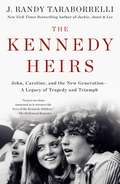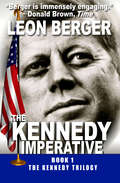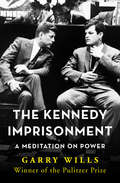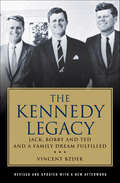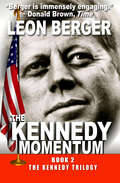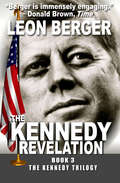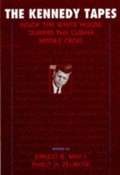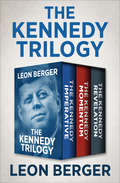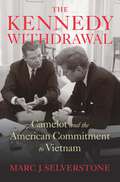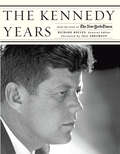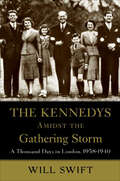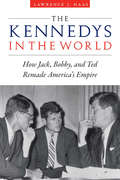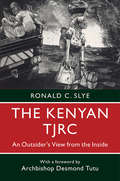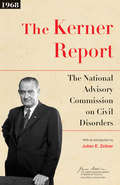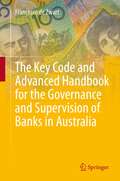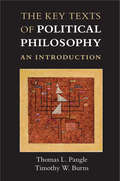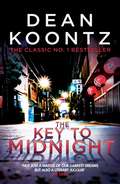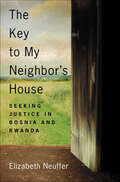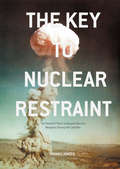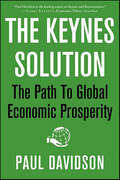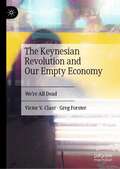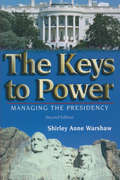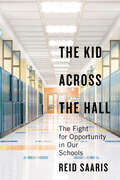- Table View
- List View
The Kennedy Heirs: John, Caroline, and the New Generation - A Legacy of Triumph and Tragedy
by J. TaraborrelliFrom New York Times bestselling author J. Randy Taraborrelli comes The Kennedy Heirs, his most revealing Kennedy book yet.A unique burden was inherited by the children of President John Fitzgerald Kennedy and his celebrated siblings, Senators Robert and Ted Kennedy. Raised in a world of enormous privilege against the backdrop of American history, this third generation of Kennedys often veered between towering accomplishment and devastating defeat. In his revelatory new book, acclaimed Kennedy historian J. Randy Taraborrelli draws back the curtain on the next generation of America’s most famous family. John Kennedy, Jr.’s life in the public eye is explored, following the Kennedy scion as he faced the challenges posed by marrying his great love, Carolyn Bessette. Riveting new details are shared about the couple’s tragic demise—and why Ethel Kennedy advised Carolyn not to take the trip that would ultimately end her life. John’s sister, Caroline Kennedy, had her own complicated relationships, including a marriage to Ed Schlossberg that surprised her mother, Jacqueline Kennedy Onassis, and an unexpected bond with her mother-in-law, Mae Schlossberg. Additional stories, many shared here for the first time, illuminate the rest of the Kennedy dynasty: Kara Kennedy, Ted’s daughter, and her valiant battle against lung cancer; how Ted’s wife, Vicki, introduced a new era of feminism to the Kennedy family; the lifelong struggles with addiction faced by Bobby Kennedy Jr. and Patrick Kennedy; the unexpected way pop star Taylor Swift helped Conor Kennedy heal after the death of his mother, Bobby’s wife Mary; and Congressman Joe Kennedy III’s rise to prominence. At the center of it all is the family’s indomitable matriarch, Ethel Kennedy—a formidable presence with her maddening eccentricities and inspiring courage.Based on hundreds of exclusive first-hand interviews and cultivated over twenty years of research—including numerous Oral Histories from the JFK Library and the Edward M. Kennedy Institute—The Kennedy Heirs is an epic drama of ambition, scandal, pride and power.
The Kennedy Imperative: The Kennedy Imperative, The Kennedy Momentum, And The Kennedy Revelation (The Kennedy Trilogy #1)
by Leon BergerBerlin, 1961: In this exciting political thriller, factual events are interwoven in an exciting fictional plot. While the construction of the Berlin Wall challenges JFK with the first major crisis of his presidency, young CIA agent Philip Marsden is sent into East Berlin on his first mission. While the tanks face off at Checkpoint Charlie, he uncovers the difficult truth about his Russian-born mother.
The Kennedy Imprisonment: A Meditation on Power
by Garry WillsWith a new preface: An &“irreverent [and] entertaining&” portrait of JFK, the Camelot mystique, and the politics of charisma (The Christian Science Monitor). Described by the New York Times as &“a sort of intellectual outlaw,&” Garry Wills takes on the romantic myths surrounding the Kennedy clan in this thought-provoking examination of electoral politics and the power of image in America. Wills argues that the much-admired dynasty, beginning with patriarch Joe Kennedy, created a corrupt climate where appearances were more important than reality, truth was discarded when it wasn&’t convenient, and an assortment of devoted loyalists sacrificed integrity for the sake of reflected glory. Touching upon topics ranging from the manipulation of the PT-109 story in the media to the authorship of Profiles in Courage to the handling of the Cuban Missile Crisis to persistent rumors of extramarital affairs, Wills offers a persuasive look not only at President John F. Kennedy and his brothers Robert and Edward, but also at the bubble that existed around them and lured in some of the best and brightest of the era. From the Pulitzer Prize–winning author of Lincoln at Gettysburg and Why I Am a Catholic, The Kennedy Imprisonment is &“a brilliant and troubling study of the Kennedy era in American politics&” (The Philadelphia Inquirer).
The Kennedy Legacy: Jack, Bobby and Ted and a Family Dream Fulfilled
by Vincent BzdekJohn, Robert, and Ted Kennedy's individual stories can be seen as essentially one, each successive brother striving to fulfill the interrupted promise of the brother before. The closing of Ted Kennedy's chapter in America's political and cultural life means that, for the first time perhaps, the real measure of the Kennedy legacy can finally be taken. This is a story of a brotherhood in three acts: Act I is John F. Kennedy's presidency, as seen from Ted's front-row seat. Act II is Robert Kennedy's five brief years as the family standard bearer, including his tenure in the Senate with his brother Ted and the memorable 82-day presidential campaign that redefined the Kennedy legacy. Act III is Ted's 40-plus years in the Senate as keeper of the flame.How did the brothers pass the torch to each other? What have the three brothers left us collectively? And who carries the torch forward now? The Kennedy Legacy compellingly answers these questions and much more.
The Kennedy Momentum: The Kennedy Imperative, The Kennedy Momentum, And The Kennedy Revelation (The Kennedy Trilogy #2)
by Leon BergerCuba, 1962: The Cold War reaches its zenith with the installation of Soviet nuclear missiles in Cuba threatening the United States. While JFK and his brother face deep divisions in trying to defuse the apocalyptic crisis, young CIA agent Philip Marsden is sent on a mission to the island where he is betrayed by a joint CIA-Mafia operation.
The Kennedy Revelation: The Kennedy Imperative, The Kennedy Momentum, And The Kennedy Revelation (The Kennedy Trilogy #3)
by Leon BergerDallas, 1963: In the immediate aftermath of the JFK assassination, the shock is multiplied for young CIA agent Philip Marsden when he learns of the death of his Cuban American wife. As evidence builds and the threats begin to mount, he discovers that the two tragedies might not be unrelated.
The Kennedy Tapes: Inside the White House During the Cuban Missile Crisis
by Ernest R. May Philip D. ZelikowIn October 1962 the United States and the Soviet Union came to the brink of war, each brandishing enough nuclear weapons to obliterate civilization in the Northern Hemisphere. For two weeks President Kennedy and an elite executive committee debated what to do, twice coming to the point of attacking Soviet military units in Cuba--units equipped for nuclear retaliation. Throughout this time, unbeknownst to many of the participants except the President himself, tape was rolling, capturing everything for posterity. These are the full and authenticated transcripts of those audio recordings. They capture the moment-by-moment decisionmaking of those with the fate of the West in their hands, struggling to make the best moves in a constantly changing and world-threatening situation. A thoughtful introduction and conclusion by the editors helps the reader understand this dangerous time in twentieth-century history and the leaders who successfully navigated it.
The Kennedy Trilogy: The Kennedy Imperative, The Kennedy Momentum, and The Kennedy Revelation (The Kennedy Trilogy #2)
by Leon BergerThree political thrillers from an &“immensely engaging&” author, inspired by the most dramatic events of the JFK years (Time). The Kennedy Trilogy is a political thriller series based on the three major crises of the Kennedy era—Berlin, 1961; Cuba, 1962; and Dallas, 1963—as witnessed factually in the Oval Office and fictionally by a young CIA agent. The complete edition contains all three books: The Kennedy Imperative (Berlin, 1961): In this exciting political thriller, factual events are interwoven in an exciting fictional plot. While the construction of the Berlin Wall challenges JFK with the first major crisis of his presidency, young CIA agent Philip Marsden is sent into East Berlin on his first mission. While the tanks face off at Checkpoint Charlie, he uncovers the difficult truth about his Russian-born mother. The Kennedy Momentum (Cuba, 1962): The Cold War reaches its zenith with the installation of Soviet nuclear missiles in Cuba threatening the United States. While JFK and his brother face deep divisions in trying to defuse the apocalyptic crisis, young CIA agent Philip Marsden is sent on a mission to the island where he is betrayed by a joint CIA-Mafia operation. The Kennedy Revelation (Dallas, 1963): In the immediate aftermath of the JFK assassination, the shock is multiplied for young CIA agent Philip Marsden when he learns of the death of his Cuban American wife. As evidence builds and the threats begin to mount, he discovers that the two tragedies might not be unrelated.
The Kennedy Withdrawal: Camelot and the American Commitment to Vietnam
by Marc J. SelverstoneA major revision of our understanding of JFK’s commitment to Vietnam, revealing that his administration’s plan to withdraw was a political device, the effect of which was to manage public opinion while preserving US military assistance.In October 1963, the White House publicly proposed the removal of US troops from Vietnam, earning President Kennedy an enduring reputation as a skeptic on the war. In fact, Kennedy was ambivalent about withdrawal and was largely detached from its planning. Drawing on secret presidential tapes, Marc J. Selverstone reveals that the withdrawal statement gave Kennedy political cover, allowing him to sustain support for US military assistance. Its details were the handiwork of Defense Secretary Robert McNamara, whose ownership of the plan distanced it from the president.Selverstone’s use of the presidential tapes, alongside declassified documents, memoirs, and oral histories, lifts the veil on this legend of Camelot. Withdrawal planning was never just about Vietnam as it evolved over the course of fifteen months. For McNamara, it injected greater discipline into the US assistance program. For others, it was a form of leverage over South Vietnam. For the military, it was largely an unwelcome exercise. And for JFK, it allowed him to preserve the US commitment while ostensibly limiting it.The Kennedy Withdrawal offers an inside look at presidential decisionmaking in this liminal period of the Vietnam War and makes clear that portrayals of Kennedy as a dove are overdrawn. His proposed withdrawal was in fact a cagey strategy for keeping the United States involved in the fight—a strategy the country adopted decades later in Afghanistan.
The Kennedy Years: From the Pages of The New York Times
by Jill Abramson“A deeply illuminating, journalistic romp through Camelot from the eyes and minds of the great New York Times reporters of that era and beyond.” —Douglas Brinkley, #1 New York Times–bestselling authorDecades after the assassination of John F. Kennedy, he still ranks as one of the top five presidents in every major annual survey. To commemorate the man and his time in office, the New York Times has authorized a book, edited by Richard Reeves, based on its unsurpassed coverage of the tumultuous Kennedy era. The Civil Rights Movement, the Bay of Pigs, the Cuban Missile Crisis, Vietnam, the space program, the Berlin Wall—all are covered in articles by the era’s top reporters, among them David Halberstam, Russell Baker, and James Reston. Also included are new essays by leading historians such as Robert Dallek and Terry Golway, and by Times journalists, including Sam Tanenhaus, Scott Shane, Alessandra Stanley, and Roger Cohen. With more than 125 color and black-and-white photos, this is the ultimate volume on one of history’s most fascinating figures.“This book is both fascinating and poignant. It brings us back into the Kennedy years while also allowing us to reflect on what made them so emotional. I found myself totally immersed.” —Walter Isaacson, #1 New York Times–bestselling author“Provides much more than a riveting first draft of history. Here we also witness the birth of modern America.” —Cokie Roberts, former political commentator and #1 New York Times–bestselling author “A terrific introduction to the Kennedy presidency for those who did not live through it, and a startling reminder for those who did of how much happened in those 1,000 days.” —David Nasaw, New York Times–bestselling author
The Kennedys Amidst the Gathering Storm: A Thousand Days in London, 1938–1940
by Will SwiftAmbassador Kennedy’s tenure during the approach of WWII is explored in “an admirably balanced assessment of an enormously complicated man” (Kirkus, starred review).In The Kennedys Amidst the Gathering Storm, historian and psychologist Dr. Will Swift presents a fresh, empathetic interpretation of Joseph Kennedy’s ambassadorship. With extensive research and penetrating psychological insight, he explores the intricate, often shifting relationships among Kennedy, Chamberlain, Churchill, and, of course, Roosevelt.Arriving in London in early 1938, the Irish-Catholic Kennedys were welcomed by politicians, aristocrats, and intellectuals, all eager to court America. They finally appeared to have overcome their lifelong status as outsiders. From 1938 to 1940, the Kennedys crystallized their identity as protagonists on the world stage, undergoing a near-mythic rise to power. The older children—Joe Jr., Jack, and Kathleen—took part in England’s glittering society, their every move chronicled by the British and American media. As Joe, Sr.’s, political fortunes dimmed, Jack published a best-selling book that launched him toward stardom and, ultimately, the White House.Drawing on recently released Kennedy family archives, Joseph P. Kennedy’s private papers, and using rare photographs of English society and the photogenic Kennedy clan, Dr. Swift brings to life this fascinating family during a dramatic thousand-day period.
The Kennedys in the World: How Jack, Bobby, and Ted Remade America's Empire
by Lawrence J. HaasThe Kennedys in the World tells a new, rich, fascinating, and consequential story about Jack, Bobby, and Ted Kennedy. From an early age the brothers developed a deep understanding of the different peoples, cultures, and ideologies around the world; a keen appreciation for the challenges that such differences created for the United States; and a strong desire to reshape America&’s response to them. From their childhoods in the first half of the twentieth century, the brothers were prodded by their ruthless, demanding, win-at-all-costs father, Joe Kennedy, and their cold and distant mother, Rose, to learn and care about the world—and told they could shape America&’s role in it. For more than six decades after World War II, the brothers shaped broad issues of war and peace as well as the U.S. response to almost every major global challenge of their times: the Soviet Union and China, the Cold War and Cuba, the Dominican Republic and Chile, Nicaragua and El Salvador, Korea and Vietnam, South Africa and Northern Ireland, and Iraq (twice). In their time, America was what it remains today—the world&’s greatest power, with roles and responsibilities that stretch across the planet. Consequently, as the brothers remade America&’s empire, they invariably changed the world.
The Kenyan TJRC: An Outsider's View from the Inside
by Desmond Tutu Ronald C. SlyeBetween 1963 and 2008 Kenya experienced systematic atrocities, economic crimes, ethnic violence, and the illegal taking of land. To come to terms with these historical injustices and gross violations of human rights, the Kenyan Truth, Justice and Reconciliation Commission (TJRC) was established. From the perspective of an insider and academic expert, The Kenyan TJRC: An Outsider's View from the Inside reveals for the first time the debates and decisions made within the Commission, including how the Kenyan Commission became the first such commission to recommend that its Chair be prosecuted for gross violations of human rights. This book is one of the few insider accounts of a truth commission, and one of the few that reflects on the limitations and opportunities of such a commission. The Kenyan TJRC provides lessons and recommendations to those interested in addressing historical injustices through a truth commission process. The full copy of the Final Report of the Kenyan TJRC, along with other supporting documents, can be found at the following site: https://digitalcommons.law.seattleu.edu/tjrc/
The Kerner Report
by Julian E. Zelizer The National Advisory Commission on Civil DisordersThe Kerner Report is a powerful window into the roots of racism and inequality in the United States. Hailed by Martin Luther King Jr. as a "physician's warning of approaching death, with a prescription for life," this historic study was produced by a presidential commission established by Lyndon Johnson, chaired by former Illinois governor Otto Kerner, and provides a riveting account of the riots that shook 1960s America. The commission pointed to the polarization of American society, white racism, economic inopportunity, and other factors, arguing that only "a compassionate, massive, and sustained" effort could reverse the troubling reality of a racially divided, separate, and unequal society. Conservatives criticized the report as a justification of lawless violence while leftist radicals complained that Kerner didn't go far enough. But for most Americans, this report was an eye-opening account of what was wrong in race relations. Drawing together decades of scholarship showing the widespread and ingrained nature of racism, The Kerner Report provided an important set of arguments about what the nation needs to do to achieve racial justice, one that is familiar in today's climate. Presented here with an introduction by historian Julian Zelizer, The Kerner Report deserves renewed attention in America's continuing struggle to achieve true parity in race relations, income, employment, education, and other critical areas.
The Key Code and Advanced Handbook for the Governance and Supervision of Banks in Australia
by Francesco de ZwartThis Key Code and Handbook examines the corporate governance and accountability of Major Banks, their directors and executives which were the central focus of bank, Supervisor, Regulator and governmental activity and public scrutiny in 2018 and 2019. This book explores this responsibility focus by providing evidence from the Global Financial Crisis and beyond with both APRA and ASIC investigating illegal conduct, misconduct and conduct which was below the level of community expectations. This book discusses how the Royal Commission into misconduct in the banking and financial services industry has already given rise to a detailed Final Report whose recommendations are still being put into effect. Further, this book uses evidence provided by the large number of Prudential Standards issued by APRA and investigations into the conduct of Major Banks by Regulators. This book explores governance variables – over 1,700 in number and grouped into 159 ‘key groupings’ or separate categories – which are all indexed to 28 governmental, regulatory and supervisory reports and documents to create a governance code and commentary specifically tailored to Australian banks. Each governance variable is modelled on the Stage 1 Relational Approach contained in Enhancing Firm Sustainability Through Governance. Given the huge interest in the governance of banks, Parts 1 and 2 – explaining the Relational Approach - of Stage 1 were recently published in November 2018 and June 2019 in the Australian Journal of Corporate Law. This book is the largest reference book and handbook in publication worldwide containing the structures, mechanisms, processes and protocols – the checks and balances we call ‘governance variables’ – that deeply addresses and explains banking accountability and regulation in Australia.
The Key Texts of Political Philosophy
by Thomas L. Pangle Timothy W. BurnsThis book introduces readers to analytical interpretation of seminal writings and thinkers in the history of political thought, including Socrates, Plato, Aristotle, the Bible, Thomas Aquinas, Machiavelli, Bacon, Hobbes, Locke, Montesquieu, Rousseau, Tocqueville, Marx, and Nietzsche. Chronologically arranged, each chapter in the book is devoted to the work of a single thinker. The selected texts together engage with 2000 years of debate on fundamental questions including: what is the purpose of political life? What is justice? What is a right? Do human beings have rights? What kinds of human virtues are there and which regimes best promote them? The difficulty of accessing the texts included in this volume is the result not only of their subtlety but also of the dramatic change in everyday life. The authors shed light on the texts' vocabulary and complexities of thought and help students understand and weigh the various interpretations of each philosopher's thought.
The Key to Midnight: A gripping thriller of heart-stopping suspense
by Dean KoontzThe past can be a very dangerous place when it is locked into a nightmare... The Key to Midnight is a page-turning thriller from Dean Koontz that delves into the darkest of dreams. Perfect for fans of Stephen King and Harlan Coben. 'Dean Koontz writes page-turners, middle-of-the-night-sneak-up-behind-you suspense thrillers. He touches our hearts and tingles our spines' - Washington Post Book WorldWho is Joanna Rand?Alex Hunter hasn't come to Japan to fall in love. But Joanna Rand is the most beautiful, exciting woman he has ever met.But Joanna is not who she thinks she is. Ten years before, and halfway across the world, a brutally bizarre experiment recreated her mind. A violation so hideous that her dreams are filled with terror and her memories are a lie.If they are ever to be free, Alex and Joanna have to reopen the dangerous door into the nightmare past. Somehow they have to find the key to midnight... What readers are saying about The Key to Midnight: 'This is a story of suspense, action and intrigue set to the backdrop of international espionage... Koontz delivers his usual blend of mystery and action that keeps those pages turning''This is an intriguing tale, a mystery and a romance but shot through with an underlying psychological horror and also a political undertone, too''As always, so, so readable, and so, so well written'
The Key to My Neighbor's House: Seeking Justice in Bosnia and Rwanda
by Elizabeth NeufferInterviewing war criminals and their victims, Neuffer explains, through the voices of people she follows over the course of a decade, how genocide erodes a nation's social and political environment. Her characters' stories and their competing notions of justice-from searching for the bodies of loved ones, to demanding war crime trials, to seeking bloody revenge-convinces readers that crimes against humanity cannot be resolved by simple talk of forgiveness,or through the more common recourse to forgetfulness.
The Key to Nuclear Restraint
by Thomas JonterWhy have some nations acquired nuclear weapons while others have refrained from doing so? Most research related to this question has focused on states that have built nuclear weapons, yet little attention has been devoted to countries that have chosen nuclear restraint. This book analyzes Swedish plans to acquire nuclear weapons during the Cold War. Sweden was very close to putting a bomb together in 1960s but, for a number of reasons illuminated in this book, decision makers abandoned those plans and subsequently rose to become one of the most recognized players in the international game of disarmament. Thanks to the recent declassification of essential documentation in Sweden and United States, it is now possible to assemble a comprehensive analysis of the Swedish nuclear weapons program based on primary sources. This book presents that analysis, a unique perspective owing to the fact that nuclear development is a highly secretive activity in most countries - with non-existent or limited access to state archives.
The Keynes Solution: The Path to Global Economic Prosperity
by Paul DavidsonToday's financial crisis has led to a widespread lack of confidence in the laissez faire style of economic policy. In The Keynes Solution author Paul Davidson provides insights into how we got into the crisis—but more importantly how to use Keynes economic philosophy to get out of this mess. John Maynard Keynes was committed to making the market economy work—but our current system has been a dismal failure. Keynes advocated for an interventionalist government role, in cooperation with private initiative, to mitigate the adverse effects of recessions, depressions and booms. His economic policy helped the world out of the great depression and was an important influencer in the thinking behind FDR's new deal policies. In this book Keynesian expert Davidson makes recommendations and details plans for spending, monetary policy, financial market rules and regulation, and wages—all to reverse the effects of our past policies. Keynes renewed influence can be seen everywhere: in Barack Obama's planned stimulus package, for example—and this book explains the basic tenant of Keynesian economics as well as applied solutions to today's critical situation.
The Keynesian Revolution and Our Empty Economy: We're All Dead
by Greg Forster Victor V. ClaarThis book considers the cultural legacy of the Keynesian Revolution in economics. It assesses the impact of Keynes and Keynesian thinking upon economics and policy, as well as the response of the Chicago and Austrian schools, and the legacy of all three in shaping economic life. The book is a call to restore economics to its roots in moral and cultural knowledge, reminding us that human beings are more than consumers. The Keynesian Revolution taught us that we should be happy if we are prosperous, but instead we feel hollow and morally anxious – our economy feels empty. Drawing on paradigms from earlier historical periods while affirming modern market systems, this book encourages a return to a view of human beings as persons with the right and responsibility to discover, and do, the things in life that are intrinsically good and enduring. Because in the long run, the legacy of our choices will continue long after “we’re all dead.”
The Keynesian Revolution and Our Empty Economy: We're All Dead
by Greg Forster Victor V. ClaarThis book considers the cultural legacy of the Keynesian Revolution in economics. It assesses the impact of Keynes and Keynesian thinking upon economics and policy, as well as the response of the Chicago and Austrian schools, and the legacy of all three in shaping economic life. The book is a call to restore economics to its roots in moral and cultural knowledge, reminding us that human beings are more than consumers. The Keynesian Revolution taught us that we should be happy if we are prosperous, but instead we feel hollow and morally anxious – our economy feels empty. Drawing on paradigms from earlier historical periods while affirming modern market systems, this book encourages a return to a view of human beings as persons with the right and responsibility to discover, and do, the things in life that are intrinsically good and enduring. Because in the long run, the legacy of our choices will continue long after “we’re all dead.”
The Keys to Power: Managing the Presidency
by Shirley Anne WarshawAn accessible and comprehensive main text for courses on the presidency, this text argues that to be a successful presidential leader, one must effectively manage the enormous institutional and personal resources - or the "keys to power." Using the "keys to power" theme, Warshaw argues that the presidency is far more powerful today than in past generations. The book offers the most coverage in the market on the structures that provide the president with such power. As a result, there are discrete chapters dedicated to the vice president, the president's cabinet, the White House staff, and the executive office of the President. Standard topics such as "the president and the economy," are still covered but are integrated throughout the chapters.
The Kid Across the Hall: The Fight for Opportunity in Our Schools
by Reid SaarisGrowing up, Reid was confused and disturbed by the radically different opportunities his best friend received. After a childhood spent together, Jamie and Reid found themselves on opposite sides of a high school hallway that separated kids based on a misunderstanding of their supposed "potential." The gap between the two friends widened as Reid's classes enabled him to pursue an elite college degree across the country studying educational opportunity and teaching. Then, Reid became a teacher at an under-resourced South Carolina high school where efforts to serve the incredible students were stymied by internal segregation and administrative ambivalence. He was disabused of the Hollywood myth that a good teacher could simply save the day, when each false start with his students forced him to reckon with how much he didn't know. After Reid assigned students a project to create a positive change, they pushed him to figure out how he, too, could make a bigger difference. While an individual's efforts are no match against entrenched systems, Reid learned firsthand that a community of people powered by data can effect change. This lesson motivated him to found Equal Opportunity Schools (EOS), a nationwide nonprofit dedicated to finding the students who were overlooked, discouraged, or otherwise missing from higher-level classes. As EOS became more successful, partnering with major philanthropies, universities, and even the White House, Reid grappled with his role as a leader. Only through the efforts of, first, his students in South Carolina, and later his team at EOS, would he come to understand, and begin to overcome, the limitations of his vision. Informed by extensive new data on educational opportunity in America, The Kid Across the Hall is a powerful story of learning and unlearning; of leading and learning to follow.
The Kidnapped Saint and Other Stories
by B. Traven H. Arthur Klein Nina C. Klein Rosa E. LujanIn addition to nine stories based in Mexico and focusing mainly on the lives of the indigenous "Indian" population, this book contains an introduction by Traven's wife, Rose Elena Lujan, that identifies (to a point) who B. Traven actually was. Also included is a political polemic, "In the Freest State in the World", concerning the socialist revolution in Bavaria and the conservative counter-revolution after World War I. The author identifies himself with an earlier pseudinym Traven used -- Ret Marut. In the introduction to Marut's polemic, the editors review the political history of that era, and how Ret Marut fit into it.
